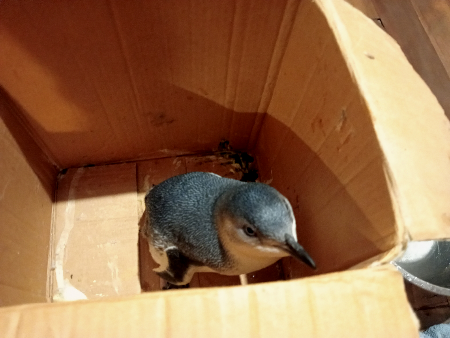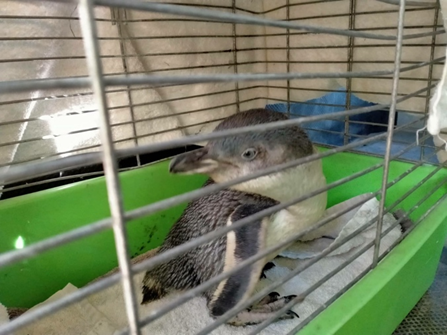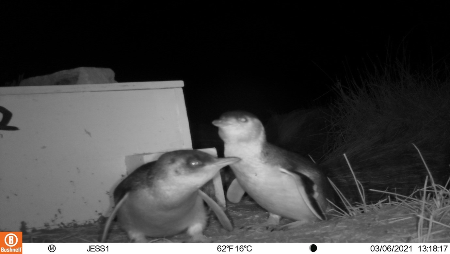Rehabilitated penguins
Penny Pōhutukawa
Happy and healthy and doing just great – But then their parents started coming home… super-duper… late.
The days grew hotter and the ocean did too – and a Marine heatwave, La Nina had the ecosystem askew.
Penny’s penguin parents didn’t show up for days - the fish were far out at sea… causing delays.
Penny and her Sister were all alone – without penguin parents, they would leave the nest and roam.
They were still too young to fend for themselves - too fluffy and small for the big ocean swells.
So, Pōhatu’s Monitoring team pick the chicks up – and bought them into rehab …the chicks were in luck!
They were hand raised by humans, who knew what to do – fish smoothies of salmon and chunky fish stew.
The sisters kept growing and baby fluff gone – time for swim lessons - to make feathers strong.
Penny and her sister - fledglings ready to go - 8 weeks old now, they were fat and healthy and had finished to grow.
The day to go back to Pōhatu was here – But rehabber Ave - had discovered a problem with Penny’s rare!
A small red ball hung from her backside – a problem only the vet could fix … so they went for a ride.
Up over the hills and off to the city - a long drive for penny- such a pity.
Weeks at the vet had Penny fixed up – The prolapse was fixed and stayed in her butt!
Time to go now and take her to sea – another long drive… and then Penny would be free.
But things don’t always work out as well as you’d hope - and the morning she was to go, her butt said… NOPE.
Argh… another long ride to Pauline the vet – this time surgery was needed - to have Penny set.
More weeks in Rehab – Penny stayed with Kristina and Thomas - until finally she was ready to go - they had felt with some Promise.
So Ave picked her up – and another long ride – Ave, nervous and weary of Penny’s Backside.
But her butt stayed put and for that Ave was glad – ok let’s release her … out of Rehab!
She was bought to Pōhatu - to a box on the beach - the ocean on her doorstep - right within reach.
Yay, Penny had gone by sunup next day – hopefully finding fish in the bay.
But again things don’t always go to plan – and Penny ending up going for another ride in a van.
The kayaking guide Ben had found a bird looking thin – and Rehabber Ave opened up a box to find Penny… within.
“oh no, you again!” Ave cried in disbelief – Penny’s butt was ok which was a …relief.
You’ve lost a little weight but you’ll be ok – it’s really time to go back to the bay!
So, Penny went for another van ride – she was bought to the beach and realised with the… tide.
The days went by and Penny didn’t turn up – good news for Penny the bird with the… Butt!
Penny Pōhutukawa is the name of one of the adult Kororā’s living in nest box F36. Box Photo:
Both their chicks came into care and we started using this name for one of the chicks.


For 3 weeks in December 2023 a marine heatwave caused by La Nina, drove the small fish the penguins rely on for food away. Adult Kororā usually forage close to the colony site when they are raising chicks. But with no fish around they had to go super far away and sometimes it took them days to get back. This can be too late for the chicks. Sometimes chicks leave the nest - an instinct to go to the big blue takes over… but if they are young and still fluffy they can’t survive. Fluffy Chicks are not waterproof. It takes 8 weeks for a Kororā chick from hatching to become a beautiful blue waterproof fledgling and be ready for sea. During monitoring of the colony, the Pōhatu conservation and research team had found many of the chicks starving and some… it was already too late.
Penny and her Sister we very lucky to be picked up on time. 4 weeks old, tiny and close to starvation. We had to hand-raise them, along with another 23 chicks we had in care at the same time. All with the same situation - their parents were not returning. We monitored our colony with trail cameras to see if adults were coming in or not and weighed the chicks to see if they were getting fed. In many of the nests, no adults came home.
Side Note; To hand raise Chicks or Rehabilitate Adult penguins - This is where our special license from the Department of Conservation comes in. We have authorization to uplift and handle Kororā for rehabilitation. In New Zealand, it is in fact illegal to handle Kororā as it is a protected, at-risk/ threatened species. We have gone through specific training over the years and are mentored by Kristina and Thomas Christchurch penguin Rehab and Pauline the head Vet at the wildlife hospital, as well as working with our Local DOC rangers.
On the day Penny and her sister were to be released, I went into give them a big feed and then get them ready to be transported to the bay. We had already microchipped them - So we could keep track of who’s who.
I walked into the enclosure and Penny waddles out, looking like her normal self, eager to be fed. But then when I picked her up, I noticed a small red ball sticking out of her butt! I freaked out, I’ve never seen anything like that before.
I called Pauline the penguin vet in Christchurch straight away. She gave me and my husband Kev some instructions over the phone about how to gently push her butt back in. It was a prolapse, something that can happen to all of us, and is apparently fixable. We tried to push it back in but it wasn’t working. I was so scared of hurting her, that I decided to just drive the two-hour trip straight to Pauline.
Penny’s Sister had no problem going to sea in healthy condition and was released with other fledglings on the day Penny was raced up to Christchurch Wildlife Hospital.
Penny spent a week with Pauline until she was happy with her. Her name on the chart was Butt bird. She had kept the prolapse back in and it seemed to be ok. So I went back to Christchurch to pick her up for release to the wild... round two. I kept her overnight with me as it was too late to drive all the way over to Pōhatu after the Christchurch trip, which is a 4-hour round trip.
And then in the morning the second attempt to release Penny… it happened again!
I called Pauline and told her we were on our way back. Pauline saying “oh no Butt bird is back”. I told Pauline the name from her nest box… which is technically her mother’s name, Penny Pōhutukawa. Pauline liked that better than Butt Bird - So that was put on her medical chart.
This time Pauline performed surgery. Penny stayed with Pauline and… Albatrosses, Shags, Hoiho/Yellow eyed penguins, petrels and many other Marine birds in care at the wildlife hospital - for several weeks. The marine heatwave had effected not just penguins but marine birds all over Canterbury and further afield. Our Amazing vet Pauline was working long hours 6 days a week.
Pauline started running out of space at the wildlife hospital - as so many birds were arriving, Penny was doing much better, but still needed a bit more recovery time. So off she went to Kristina and Thomas at Christchurch penguin rehab.
Kristina and Thomas had quite a few Kororā in care. One of them they named Houdini as he kept trying to escape his enclosure. He was a White flippered Kororā - found very thin, half way through his molt, exposed on a public beach in Kaikoura. Penny and Houdini became fast friends during their time and became inseparable. While Kristina and Thomas were cleaning out the enclosures the two penguins would contently be calling to each other and when reunited would jump all over each other in joy to be back together.
When the time came that Penny was finally ready to be realised … round 3. Kristina and Thomas didn’t want to separate her from Houdini. So, I picked them both up from Christchurch, drove all the way home and again Penny and now Houdini stayed the night at our care facility in Akaroa.
In the morning, when I went to get Penny and Houdini ready for transport to Pōhatu, I was secretly freaking out I would find Penny’s butt hanging out again - even though she had fully recovered and she was in prefect health… I still had this fear, I think I’ve been traumatized by the Butt ball! But fortune was on my side this time and everything was completely fine.
So Penny and Houdini where bought to the soft release beach box in Pōhatu where they could find their own way to sea. The next day they were both gone! Yay. We had video footage of them leaving together on our trail cam. No more Butt bird to worry about… until.
4 days later. Ben our kayaking guide messages me while I’m in Christchurch with another penguin I’m picking up from the Kristina and Thomas. Bens message - I’ve left a skinny penguin in your kitchen. There’s a photo. I’m like, oh no that looks like Penny… When I get home I scan the Kitchen bird sitting nonchalantly in a the box… opening it’s beak for food. That’s not normal penguin behaviour.
And yes. It’s Penny. Being a bit too friendly. But all and all she looked a bit slimmer but her weight was ok. This is not Ideal I told her.
Ben had said she was sitting on the beach in the way of the kayak tour looking sorry for herself. He figured it was a rehab bird which hadn’t gone yet. Which is the whole point of soft release. They know where to find us if they still need help.
Penny was fed up and then she went out with the next van going over to Pōhatu. They released her that night and now that I’m writing this we haven’t seen her since. I’m hoping she finds Houdini. One day we might find her again - if she chooses to nest in our colony. Penny is Microchipped and we monitor the nest boxes once a week. So if I ever find Penny and Houdini in a nest together. I will be the most happy rehabber in the world!
Thanks for Reading.
Ave.

Penny and Houdini leave soft release box together.
|
Ideally, we don’t want to handle our penguins at all. However, some of them need our help whether it be from an injury, illness or malnourishment. Pohatu Penguins steps in and gives these little birds a second chance at life! Most of our rehabilitated penguins are underweight or malnourished chicks. Typically, we find these chicks during our tours as we monitor the nesting sites. Why are the chicks malnourished/underweight?
What do you do in rehabilitation? This depends on the penguins needs and condition. Typically we will feed them 2-3 times a day depending on their weight and age. If they are old enough we will bring them for a swim in our “swim therapy pool”. Here, we introduce them to the water and determine if they are ready to be released. Injured or sick penguins will be sent to either a specialized penguin vet or dedicated specialists, Kristina and Thomas*, in Christchurch where they are assessed for future placement. Permanently injured penguins have the chance to live out their lives at the Antarctic Centre. *K&T Link: https://www.stuff.co.nz/environment/88518082/christchurch-couple-give-injured-rescue-penguins-the-full-pamper-treatment ParniaI spotted Parnia while kayaking; she was standing on the rocks looking extremely thin and weak. After getting back onto shore I quickly grabbed a bucket and went on to retrieve her – she gave little resistance to capture. Once I saw her up-close I realized that she had a deformed beak, probably why she had been so thin. (It’s very difficult for penguins to hunt efficiently with a crooked beak, most die.) I had never seen such a thin penguin and I expected her to die within the day, but still it was worth a shot to try and save her. Penguin band: P 41 087One year a starvation event happened right in the middle of the breeding season. When starvation occurs parents stop feeding their chicks to save themselves or only do so periodically. Chicks are then forced to leave (or fledge) the nest early in search of food. Unfortunately, chicks under 8 weeks old are not properly equipped to survive at sea and either starve or drown. In order to prevent early fledgings I fed the chicks while they remained in their burrows, hoping that the starvation event would end soon. Slowly but surely the parents started to return consistently feeding their youngsters and relieving me of my duties! Two years later P41 087 (we used to band our penguins) turned up in one of my breeding boxes. He was one of the largest, most beautiful penguins I had ever seen. P41 087 was evidence that my feedings, two years ago, had been a success. It warmed my heart to know that I helped save this little penguin and build him up for a healthy, successful life in the wild. He was my pride and joy. RoxyRoxy was handed in by the Fox II, a tourist sailing boat in Akaroa. She was extremely thin with a severe injury to her eye. Roxy looked like a recently fledged chick that seemed to have been hit by a boat. Her condition was very grim and I had my doubts about her survival.
However, to my delighted surprise she survived the first 24-hours, then the next and the next, and by day 3 she was on the road to recovery! Her eye injury, however, would be permanent and she would never be able to see from it again. Although, she was doing well in rehabilitation we knew that she wouldn’t stand a chance in the wild, thankfully, Roxy was also sent to the Antarctic Centre where she’ll live out a long and luxurious life! Shark baitThis is an all time favorite story that demonstrates incredible intelligence – intelligence you would never expect from a penguin. One night, while running an Evening Penguin Tour, we found a horribly injured penguin beside the track. I immediately took him into care and the next morning rushed him to Christchurch for an emergency veterinary assessment.. He had several shallow, flesh wounds and a lacerated leg. We suspected the culprit had been a shark. The vet stitched him up and I took him home to recover.. He spent a few weeks with us recovering and eating lots of fish – something he was quite happy to do through his moult*! Once his moult was complete we returned him to the sea and he happily shot off like a rocket! One year later, while running a tour, in the same spot on the tarck out in the open, we found a penguin near the track and out in the open we found a penguin that did move away from us as he should. He also did not attempt to bit and was very relaxed when I picked him up to examine him to find an explanation for this strange behaviour. He was in very good condition, but lame in one leg as Shark bait was when we released him. He proved beyond doubt who we was when I tried to feed him. He snapped and gulp the fish down gleefully and then looked for more, greedy as ever. As he was looking forward to another free easy loading molt we decided to indulged him and sent him on his way, fat and sleek once his feathers were grown in. Once again he shot off, instantly a wild penguin, but we did wonder, would he be back next year for another easy moult*? *Little Penguins moult – loose their old feathers and grow new ones – for two weeks every year. During the moult they cannot hunt and thus starve until it is complete. Yappy WiggleThis was the funniest penguin I’ve ever cared for! One day, while monitoring nesting sites I came across a burrow with one healthy chick and one very small runt. If one chick gets too far behind they simply die and the fouled nest can cause the healthy chick to become sick and die. The best option was to take the runty chick out, but then what to do with it? I decided I would simply throw it in the bushes. It’s very difficult to raise chicks that are less than 2 weeks old, especially if they are runts, but I thought I’d give it a go. Trying to feed such a young chick was not easy, but the little guy responded well and started to put on weight. Soon enough he turned into a healthy, respectable penguin. He became far too tame, however, and ran around like a puppy dog, wiggling his tail and begging for food with sharp, yapping noises. When it came time for him to leave he wasn’t exactly keen. On the first release he returned the next day yapping his way up the drive, begging for more fish. He had obviously not found any for himself. I allowed him to stay for a few days until I figured that we better try again; so, for a second time we released him back into the wild. He returned the very next day for more fish. I fed him once more and came up with a new idea, we’ll release him by kayak! So, in our third release, we took him by kayak to the entrance of Flea Bay and let him go. This seemed to be successful until the fifth day when we saw him hobbling towards the house. This time he was much weaker, thinner and a bit injured. I assumed he had hurt himself along the rocks and barnacles while exiting the sea. After our third try, we realized that Mr. Yappy Wiggle had imprinted on us and would not succeed in the wild. He now happily resides in the Antarctic Centre yapping and wiggling all over the place! Our Christmas Eve SagaBefore you read this you must understand: Yellow Eyed Penguins are the rarest penguin in the world and are extremely endangered. Every single one is precious. One Christmas Eve during a penguin tour we saw one of our Yellow Eyed Penguins drag itself ashore, obviously injured and bleeding. We caught the Yellow Eyed to gauge its injuries in which its feet were badly cut. It looked as though it kicked itself free from the jaws of life and escaped a near death shark attack. It needed stitching as soon as possible if it was to survive, but what vet would be open on Christmas Eve or Christmas Day? Talk about bad timing. I rang our closest vet in Little River and to my surprise he said to bring it straight over. This was 10.00pm on Christmas Eve. We arrived in Little River at 11.30pm, but the vet was nowhere to be seen. We sat there waiting and silently panicking over this precious penguin’s life. Until suddenly a vehicle pulls up with the vet and vet’s family! In order to successfully and painlessly stitch the penguin he needed to be put under. However, this can be dangerous if the penguin has a full stomach – something we weren’t sure about. We simply had to hope for the best and move forward with the procedure. The penguin did not fair well with the gas, he kept drifting in and out of conscious. Then, suddenly he started to heave and projectile vomit fish across the table, the floor and even the walls! Now, you can imagine our surprise, you can also imagine that it was quite unexpected and unfortunately we did not have time to react. So, like the table, the floor and the walls, we too were covered in fish vomit. Merry Christmas indeed! Thankfully after loosing its stomach contents our Yellow Eyed Penguin drifted into sleep and the vet was able to finish the job. With stitched and bandaged feet we placed our groggy penguin back into our vehicle. As we had to get the penguin home our vet and his family had to clean up the fish vomit – lucky them! We bid farewell and wished our Christmas heros a very Merry Christmas. After Christmas I sent the penguin to Christchurch to my wonderful friends and penguin rehab specialists, Christina and Thomas. Once it healed properly we released our Christmas penguin back into the wild. |
 Feeding chicks Feeding chicks Rehabilitated penguins in our garden going for a walk  Swim! (allow the penguins to oil up their feathers)  Releasing an adult.  Two chicks ready to go! (White flippered and Little Blue)  Trying to release Yappy Wiggle.  Still trying to release Yappy Wiggle...  Yellow Eyed Penguin with stitched foot.    |
|
These are just a few of the more memorable birds we have had in care. We rehabilitate many penguins, mostly Little Penguins, sometimes Yellow Eyed and occasionally a Crested Penguin. Most are sent off to sea successfully! If you too wish to help visit our Adopt a penguin page. |


Comments